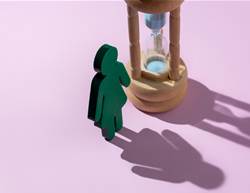Menopause is something that should be on every woman’s radar from their early 40s. While the average age of menopause is 51 (officially when periods have stopped for 12 months), our hormones can start to roller-coaster over the four to six years before that. This causes all kinds of strange health issues, a time that’s known as perimenopause.
Misunderstood menopause symptoms
While symptoms like hot flushes get a lot of attention, other symptoms can range from sleep problems to brain fog, mood swings, funny itches and headaches. All in all, it’s easy for a doctor to misdiagnose what’s really going on.
“A whole range of symptoms can be due to menopause,” explains Dr Sarah White, CEO of Jean Hailes for Women’s Health in Melbourne.
Brain fog, for example, can often be misunderstood.
“A number of women have told me that they've started Googling ‘early dementia’, when it was perimenopause,” says Dr White.
“I had another friend who said ‘I think I've got long COVID because I'm really forgetful.’ There's this is real lack of understanding of what the symptoms are caused by.”
It would be good if there was a simple blood test to tell us that we’re in perimenopause but with hormone levels swinging on a daily basis, what’s normal on the day of the test may be totally different the day after.
“Unfortunately, it really is that collection of symptoms [that is the only clue]” says Dr White.
Around “20% of women will have severe symptoms, 20% of women will have no symptoms, and the remaining 60% will have a bunch of symptoms. It might be forgetfulness or brain fog, it might be vaginal dryness, it might be really bad periods and irregular periods. It could be a whole host of things.”
First, find the right GP
So, if weird things are happening to you, your moods and your health, what menopause questions should ask your GP? First, it’s important to realise that not all GPs have much training in managing menopausal symptoms. Plus, sometimes it’s a matter of finding the right fit for you.
“Sometimes you don't click with a doctor. You don't feel like you've quite been heard. We hear from women all the time, who feel like they've been dismissed or disbelieved, which is awful,” says Dr White.
She suggests you should ask your GP if they specialise in menopause. “If your GP flat out says ‘I don't do menopause’ (yes, some actually say this), I would be looking for another doctor. Women definitely should be looking for a specialist.”
You can find a doctor with expertise in treating menopause at the Australasian Menopause Society.
Be clear and comprehensive
Before your doctor visit, it’s important to prepare. Download this free symptom checklist from Jean Hailes and check off which symptoms you’re experiencing and how severe they are.
“Having that really focused list of symptoms is key because (perimenopause) is sometimes a grab bag of quite strange things going on.”
“This list will help the GP immediately recognise where there's something that actually needs further investigation or exclusion before we can talk about menopause.”
Some menopause symptoms are trickier to discuss than others, like vaginal dryness or itchiness. But Dr White encourages us not to feel self-conscious.
“It is just something that happens in the body. Don't be embarrassed. It's a fact of life.”
You may also have a list of questions for your doctor about treatment options.
Be informed and prepared
“If you're a woman who's experiencing half a dozen different symptoms that are really bothering life, take the time go and read lots of information,” she suggests.
The website of Jean Hailes for Women’s Health has a comprehensive suite of these resources, including information on symptoms, treatments and how to look after yourself.
“Make sure you're armed with that information before you have the conversation with a doctor. And challenge the doctor. It really requires a doctor to have a very nuanced response, and not say, ‘Oh, you're depressed, take this happy pill’.”
But that’s what sometimes happens. Depression and mood swings are common symptoms of perimenopause, but can also be down to many other factors. It’s easy for GPs to with limited time to prescribe anti-depressants rather than probe your health concerns a little deeper and give your symptoms the relief they need.
Effective treatments for menopausal symptoms range from menopausal hormone therapy to natural therapies, and even swapping out some foods in your diet.
Your doctor should also be considering other areas of your health as you get older, such as bone density, weight and heart health.
Just as finding the right treatment can sometimes be a matter of experimenting, finding a doctor that you click with and have trust in may require ‘doctor shopping’.
“If you're not getting any luck, go and find a menopause specialist doctor. Prioritise yourself and take the time to look after yourself and your health.”
Listen to more of Dr Sarah White’s advice on our Thriving in Menopause podcast.






.jpg&h=90&w=90&c=1&s=1)


.png&h=193&w=250&c=1&s=1)



